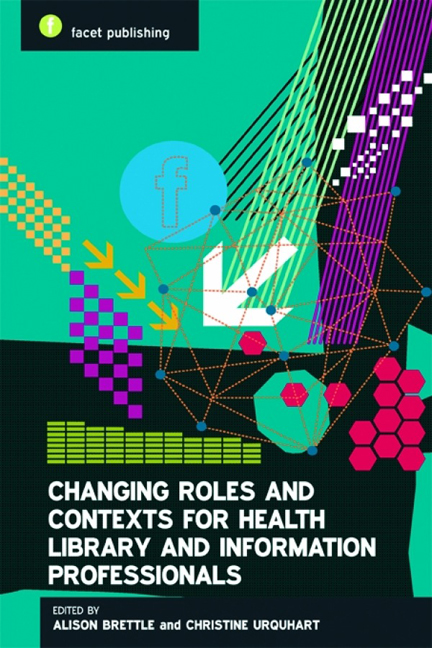Book contents
- Frontmatter
- Contents
- About the editors
- List of contributors
- Overview
- Part 1 Context
- 1 The changing context of health for library and information professionals
- 2 Changes in information generation and use
- 3 Changing technology to meet clinicians’ information needs
- 4 The influences of governance, consumers and evidence-based practice
- Part 2 Roles
- Conclusion
- Index
2 - Changes in information generation and use
from Part 1 - Context
Published online by Cambridge University Press: 08 June 2018
- Frontmatter
- Contents
- About the editors
- List of contributors
- Overview
- Part 1 Context
- 1 The changing context of health for library and information professionals
- 2 Changes in information generation and use
- 3 Changing technology to meet clinicians’ information needs
- 4 The influences of governance, consumers and evidence-based practice
- Part 2 Roles
- Conclusion
- Index
Summary
Introduction
This chapter provides an overview of the way changes in publishing (in the widest sense) and information use are affecting library and information services in the NHS and higher and further education, and points to the way the health services aimed at greater patient and client choice will affect how primary health care services (and social care services) will be organized. Library and information services are changing and will change even more, with different models of service delivery likely to emerge. In the first section, Jenny Turner and Louise Goswami present the perspective from the NHS, discussing the implications of continuing professional development for a much wider range of staff, the needs of students on placement, and the way e-resources and open access publishing will change the ways in which staff access materials. Such open access ideals often fall foul of NHS firewalls, however. The next contribution, from Neil Ford, discusses some of the changes from the higher education perspective. Assumptions that all incoming students will be Millennials and digital natives need to be tempered by the fact that many students entering degree courses in the health professions are mature students. In many ways, such mixed groups are more rewarding to teach and support, but it is not possible to make sweeping assumptions about the information and IT literacy of the student cohort. We are still collecting good evidence about the effectiveness of various models of information literacy support, but it is likely that excellent liaison with academic staff and a support programme that is suited to many different levels of skills and knowledge is likely to be more effective than the library operating on its own. As Neil Ford points out, evidence-based practice means something to health students, and if information literacy programmes are not seen to contribute to evidence-based practice then they may not seem relevant. It is also important to remember, as Sue Lacey Bryant points out, that the existing evidence that is needed to make a decision about commissioning may be hard to find. The evidence may not come already prepared, it may need to be put together from multiple sources, and that includes sources that are not published in the traditional sense of books, journals or reports. And the information on costs is more vital than ever.
- Type
- Chapter
- Information
- Publisher: FacetPrint publication year: 2011



